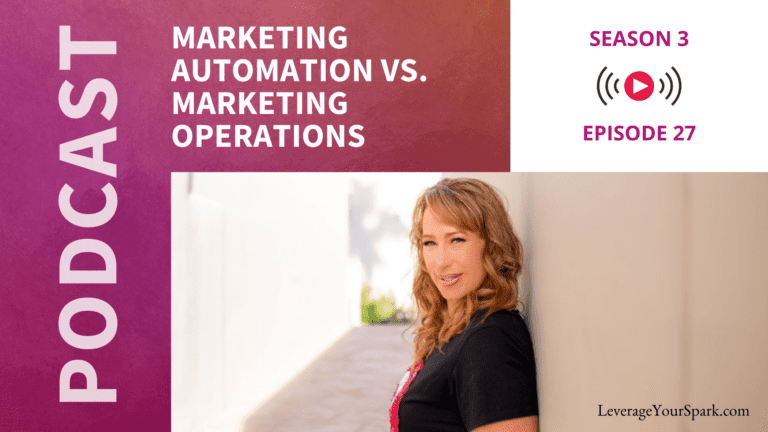Marketing Automation vs. Marketing Operations

By now, pretty much everyone has heard of marketing automation, but marketing operations isn’t quite as well known. In this episode of Leverage Your Spark, we’ll decode how marketing operations is different from marketing automation.
Listen Season 3: Episode 27
What Is Marketing Automation?
Marketing automation isn’t just one thing. It is really more of a generic term for all the apps, software, platforms, and technology used to find, attract, engage, nurture, convert, and retain customers. Likely there isn’t a business today that isn’t using some kind of marketing automation.
Some common examples of marketing automation include email marketing software like MailChimp or ActiveCampaign, customer relationship management software like HubSpot or Pipedrive, or social media schedulers like Postoplan, Sprout Social, or Hootsuite.
What Is Marketing Operations?
If you imagine marketing automation as fancy upgrades and features for a race car, then marketing operations is the pit crew. They are the team that first understands what kind of race the team is engaged in, who is driving the car and can then use the features of the car to contribute to the best performance in the race.
The marketing operations team creates the processes to ensure repeatable results, proper integration of all the tools used by the marketing team, and reliable data collection so that data-driven decisions can be made to get the best possible results.
Under the guidance of marketing operations, not only does the marketing automation get used to its fullest potential, but metrics and data also get fed back to the team so that changes can be made to the strategy and plans to keep improving the performance of the team.
Why Marketing Automation?
At the risk of stating the obvious, teams use marketing automation to do more with less and keep up with all the ways to connect with potential customers. Marketing automation lets the robots handle the things that humans are bad at, so humans can do more of the human-y stuff. It’s great for scheduling emails, managing databases, sending nurture sequences, and profiling potential leads. Humans then can spend their time and energy having conversations, analyzing data for insights, and conducting big-picture thinking.
Why Marketing Operations?
A high-performance machine needs an expert team to run it. The more technology employed by a marketing team, the higher the need for marketing operations. Almost every marketing professional I know has a story about a new software or system getting set up and then the person who set it up left and no one else knew how to run it. Using a marketing operations team avoids these situations because, in addition to setting up and running the systems, they also create the processes and documentation to ensure the systems can stay running and adding value, not being eventual obstacles to success.
Marketing Automation or Marketing Operations?
In the matchup of marketing automation vs. marketing operations, there is no vs; you need both.
Marketing automation can transform the way marketing gets done, adding efficiency and more possibilities for reaching, engaging, and converting customers.
But if you want to drive a high-performance machine, you’re going to need the expertise and insights from a good pit crew. A strong marketing operations team ensures you’re using your tools to their highest potential.
Keep Learning
This concludes season 3 of Leverage Your Spark where we walked through 27 episodes exploring marketing operations. Season 4 will launch in 2023 with more tasty morsels of marketing and technology for you.
It’s frustrating when things change because updating can be a time suck. There’s stuff to learn, plans to make, and then you have to do the work to move. Let’s shortcut your move to Google Analytics 4. Grab the Quick & Dirty Guide to Google Analytics 4 Setup to get just what you need to know to easily move to this new platform. Download the free guide at getffx.com/ga4.

